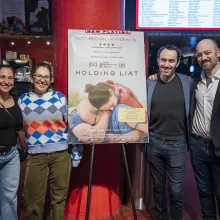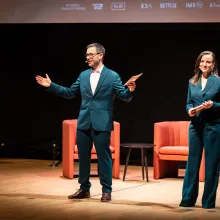Over 50 Israeli Documentary Filmmakers Support International Boycott in Open Letter Condemning Gaza War
Documentary Politics
In this op-ed, filmmakers Lance Kramer and Brandon Kramer provide an accounting of what achieving #2 at the U.S. box office actually requires for self
In this interview, the Kramer brothers discuss ethical challenges and considerations in Holding Liat and weaving consent into the fabric of their
“Always balance, everything in balance,” intones Raul Niño Zambrano, all smiles and relaxed on the last morning of his fourth year as creative director of Sheffield DocFest. It’s an aspirational mantra for a festival that seeks to elevate the documentary art of drawing meaning from chaos; in a capsizing world that needs independent media more than ever but would rather attack it, a confident and constructive place to rally is vital. Brexit cut off Creative Europe and Creative Media funding and visa-free visits from Europe, the pandemic hammered revenue and audience habits, and the UK remains in a deep industry recession with more than half its freelance workforce out of work and its once-mighty broadcasters on the back foot. And yet the festival has steadied.
Last year, national and international press widely reported on what The Globe and Mail described as “the most tumultuous year in the festival’s history,” complete with sweeping personnel changes, social and financial pressures, and the temporary closure of their flagship Ted Rogers Cinema. Though Hot Docs managed to pull through for its 32nd year with a new executive director (Diana Sanchez, formerly of TIFF) and a replenished staff (some of the programmers, including department head Heather Haynes, returned after their prior exodus), what frightened this hamstrung fixture of Toronto’s flailing film scene was dismally clear. Social issues don’t entirely permeate the programming, nor do their chosen films observe such issues in totality, but Hot Docs has always strived to stay in tune with urgent matters of the present, especially through films that align their audience’s point of view with what will one day be the right side of history.
The 23rd edition of CPH:DOX wrapped last month, with record-breaking attendance and satisfied delegates at the festival’s market, but individual events at the industry conference revealed ruptures in the front of documentary unity against political threats. Filmmaker Omar Shargawi issued one of the most visible criticisms, reading a statement contrasting the festival’s support of Ukrainian filmmakers to a lack of “solidarity with the Palestinians” at an industry talk. At the closing ceremony, Artistic Director Niklas Engstrøm and Executive Director Katrine Kilgaard said their aim was “pluralism” and “to make room for a multitude of opinions and ideas, including those that challenge our own perspective as a festival.” Documentary reached out to Engstrøm for further comment via email after the festival ended.
Despite the fact that CPH:DOX has emerged as a highly successful and thriving destination for the documentary industry every spring, this year’s event was shrouded by global economic and political turmoil. If previous year’s editions rehashed familiar complaints about financing and distribution woes, this year’s threats were both more urgently physical and existential. American documentary filmmakers looking for life preservers in Europe in the face of the “MAGA-ification of U.S. gatekeepers”—as Variety called it in a festival report—found the consensus in Copenhagen was that it wasn’t going to be easy.
Thessaloniki International Documentary Festival’s industry platform Agora has gained prominence among documentary professionals and become one of the key events in the winter calendar. Documentary Magazine spoke to Vergou and several professionals in attendance to take stock of this year’s market, examining content trends and the current climate for business. When discussing content trends, Vergou focuses on the growing conversation about supporting filmmakers who lack access to national funding due to political reasons or who have been forced to flee their home countries due to persecution. This year, Agora, in collaboration with DOK Leipzig’s DOK Industry, launched the Doc Together initiative to provide practical support.
Yesterday, Miami Beach Mayor Steven Meiner officially rescinded his recent proposal to defund and evict the government-housed and funded O Cinema for showing No Other Land. At a Miami Beach City Commission meeting on Wednesday, March 19, Meiner presented an alternate proposal, which would require the independent theater to “showcase films that highlight a fair and balanced viewpoint of the current war between Israel and the groups Hamas and Hezbollah.” “We were so very glad to see the vast majority of the commissioners speak up for the importance of free speech without government interference,” O Cinema co-founder and board member Kareem Tabsch tells Documentary, after the meeting concluded. “And grateful that Mayor Meiner listened to his community and his colleagues and withdrew the resolution.”
By programming the Academy Award-winning documentary No Other Land , the Miami Beach-based O Cinema attracted the ire of Mayor Steven Meiner, who last














